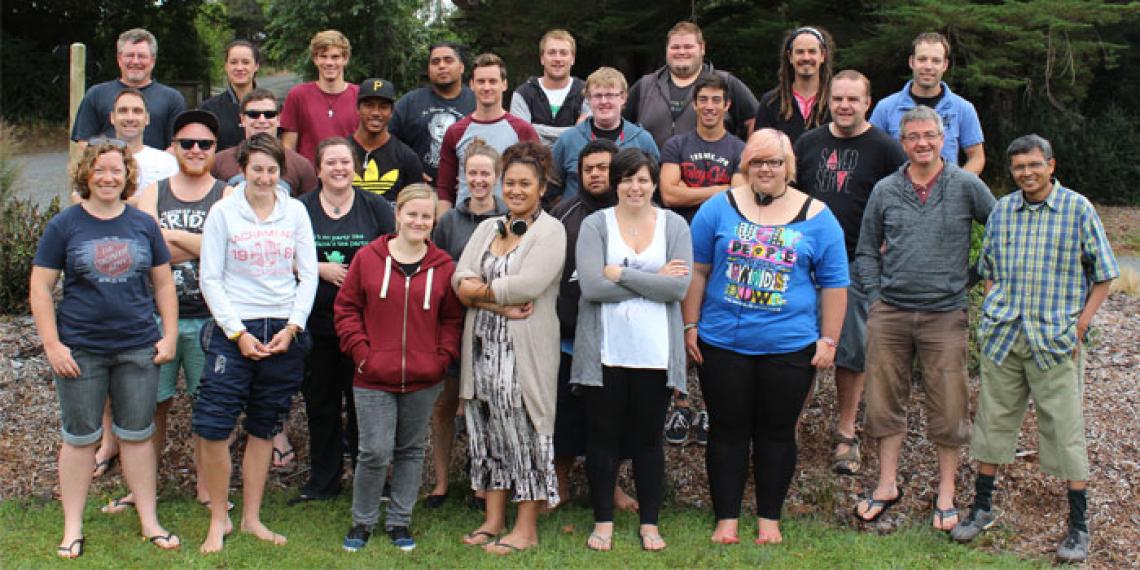You are here
Developing effective youth leaders

The Salvation Army’s Youth Work Apprenticeship is an intensive and practical training programme within New Zealand that equips people wanting to pursue youth work employment with the skills and tools to provide quality youth work in a corps or centre.
Apprentices come from all over New Zealand and spend three years in one of six ‘LABs’ (Living And Breathing model training sites) at Salvation Army corps (churches) in Auckland, Wellington, Dunedin or Southland, which all have diverse expressions of youth ministry.
They are exposed to a range of projects and responsibilities within the LAB corps and community—and train under experienced Salvation Army youth workers to develop skills, gain valuable experience and strengthen their relationship with God. Apprentices are involved in hands-on youth work at their LAB as well as academic study, working toward a Praxis Diploma in Youth Work and Laidlaw College Diploma in Biblical Studies (Youth Track).
The Praxis Diploma covers youth development strategy, mission theology, professional youth work supervision, safe practice and ethics. The Laidlaw College Diploma provides students with an introduction to biblical studies, theological studies and spiritual formation. It prepares apprentices to live out the Gospel of Christ, engaging thoughtfully and compassionately in the world. Because apprentices train alongside experienced youth workers in LABs, the programme develops youth leaders within a Salvation Army context. This opportunity gives them the knowledge and experience to outwork their training in Salvation Army corps and centres, as well as other avenues.
‘By the end of the programme, apprentices will have developed the disciplines necessary to both maintain their own spiritual growth and to serve in leadership capacities within the church and in our communities,’ says Captain Rebecca Gane, Territorial Youth Secretary.
The apprenticeship is about encouraging trainee youth workers to get involved with the Salvation Army mission of ‘caring for people, transforming lives and reforming society’, something that trainees have found incredibly worthwhile. ‘I love seeing the youth grow and reaching higher than their highest goal,’ says Annika Bowley, a fi rst- year apprentice at the Wellington 614 LAB. ‘I feel like it’s what I’m supposed to do. I can’t picture myself doing anything else.’ Mike Shore, an apprentice at Dunedin Nite Church who is in his final year of training, says, ‘It’s been fantastic spending time with youth—hanging out, sharing stories and helping young people come to grips with who they are.’
The scheme is proving really beneficial for corps where the apprentices are based. Jono Bell, a LAB Facilitator at Waitakere Corps, says, ‘I love seeing our apprentices grow, with massive growth spiritually and in their work with young people. They’re going forward in leaps and bounds!’ And while youth work apprentices gain experience in one LAB, the goal is that each apprentice will eventually take their skills and experiences to a role at another corps or centre. ‘We want to build our apprentices up so they can take all that knowledge and experience to another part of Th e Salvation Army,’ says Jono.
At the end of their apprenticeship, qualifi ed youth workers will be available for employment at corps and centres. Discussion between LAB Facilitators, Divisional Youth Secretaries and potential employers will be an important part of this transition process. Employment as youth workers is encouraged through incentives such as the reimbursement of study fees if successful apprentices
maintain long-term employment with The Salvation Army. This reimbursement scheme is great for the apprentices and is also a refl ection of how important qualified, professionally-focused youth workers are to the Salvation Army mission.
Captain Gane explains, ‘The whole idea of the apprenticeship is not only to up skill and journey alongside people who are passionate about making a diff erence with young people, but also to ensure we develop
qualified and experienced youth workers who will make an impact on local corps and communities—and the Army’s wider mission.’
Currently, 13 apprentices are training as part of the apprenticeship programme. Three are due to complete their apprenticeship at the end of 2013. They will graduate with a fantastic education, pastoral skills applicable in a range of settings, and experience of practical youth ministry in a Salvation Army context.
Applications for the Youth Work Apprenticeship in 2014 open soon. - Visit www.firezone.co.nz for more information.